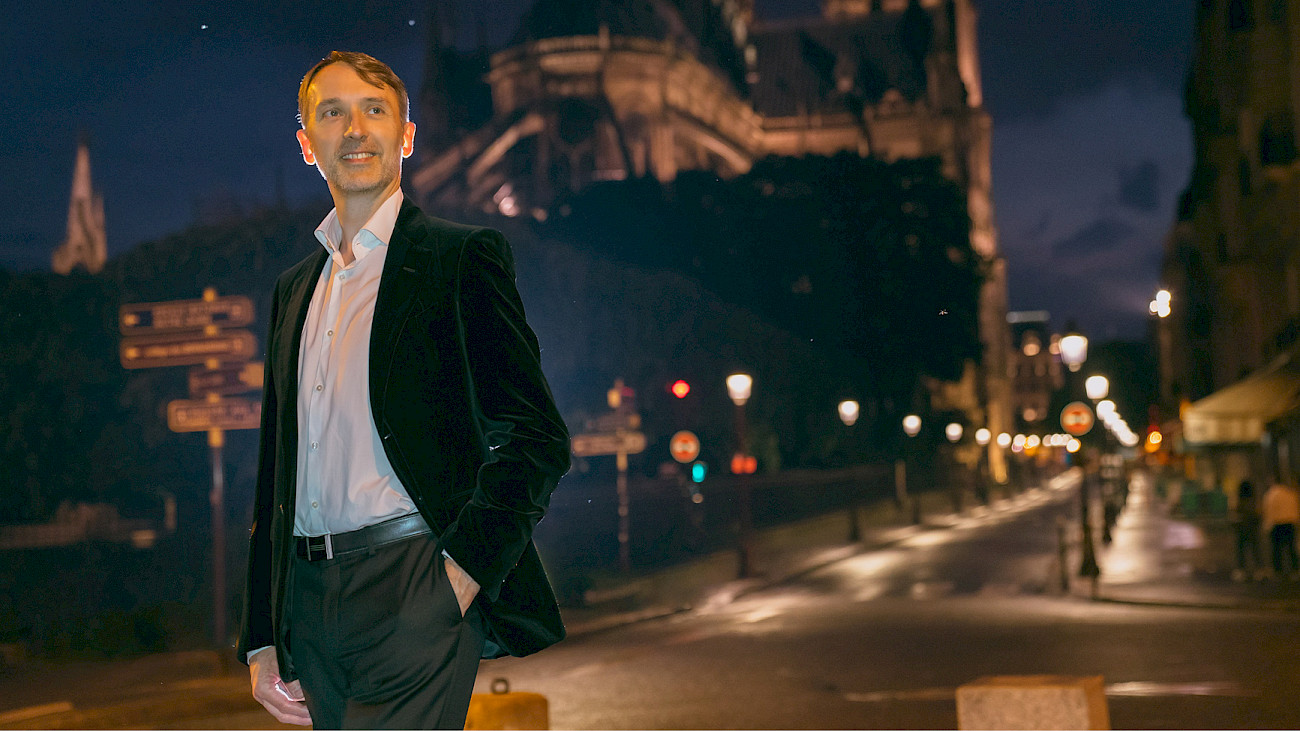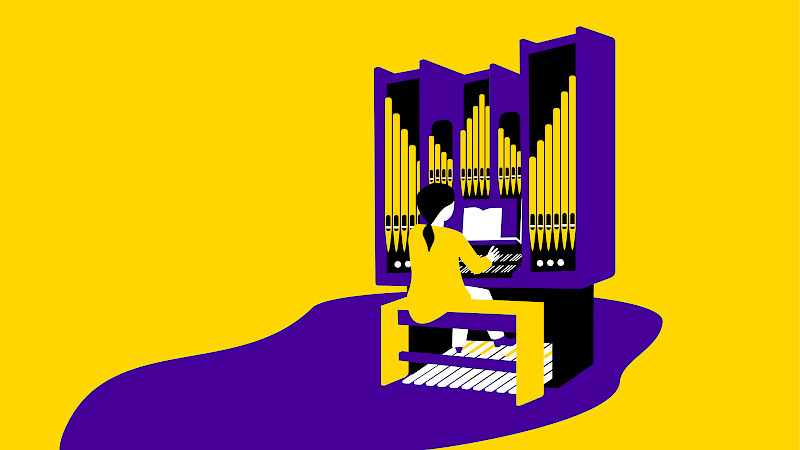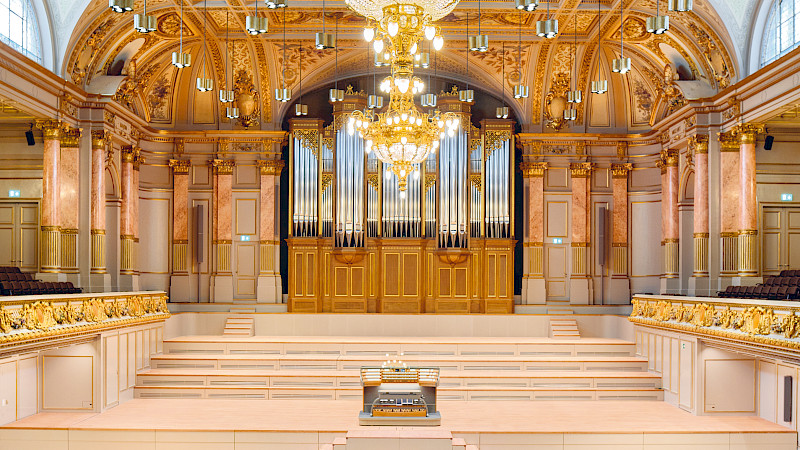
"The echo is different than before"
Olivier Latry, one of the titular organists of Notre-Dame, will be making his debut with us in June 2025. In this interview, he talks about his Parisian organ, the art of improvisation and his choice of programme.
You have been one of the titular organists at Notre-Dame Cathedral in Paris since 1985. The organ wasn't too badly damaged in the fire in 2019, but you weren't able to play it for five years. Did you miss anything?
I didn't miss the organ that much. It's a bit strange, but since I've been organist at Notre-Dame, it's been restored twice, once in 1992 and then in 2014. Both times, the instrument was unplayable for three years. Then came this fire, and of course the restoration took a little longer this time, but it felt the same. So we had already got used to not playing the organ (laughs). That's one thing. The other thing: I played a lot of music at Notre-Dame - a lot, a lot. At church services on Saturdays and Sundays, of course, but also during the week at rehearsals. I played during the day and at night - and that's a bit like overeating on something so that you can't see it the next day. The same goes for me and the organ. So I was able to live without it for a good five years. That wasn't a problem. It would have been different if it had been destroyed, but it was still there.
And what did you do while Notre-Dame was a building site?
The same as before: I gave concerts, taught at the conservatory and sometimes also accompanied church services in Saint-Germain-l'Auxerrois - in the "representative church", so to speak. There is already a titular organist there. So my colleagues and I were his deputies.
On 7 December 2024, not only was the rebuilt and renovated cathedral unveiled, but also the completely overhauled organ. How did it feel to be able to play there again in front of an audience?
I had mixed feelings. Of course it was a great joy, but at the same time it was also associated with fear (laughs). The cathedral is open, but not quite finished yet. That was difficult. You don't really know which way to go to get to the organ. The keys weren't there at the beginning. Yes, there were a lot of unpleasant things. I have to say that I don't really like performing at extra events like the inauguration. My job is actually to play at the service in Notre Dame. I like that very much, but these special occasions are almost too much for me. It's wonderful that normal life is returning - if "normal" life is even possible in Notre-Dame.
How does the instrument sound now?
I think the organ sounds the same, but not the cathedral. The reverberation still lasts seven seconds, but the echo is slightly different. Before we could hear the reverberation and now it's more like a big lorry driving past (imitates the noise). That's surprising.
So it's a familiarisation, even though it's the same instrument?
Yes, exactly. There's a lot of saturation at the moment. We really have to be careful that the organ isn't too loud. It can quickly become unpleasant. We have to adapt to this new acoustic. So we can't play the organ like we used to, we have to wait longer, breathe more - there's a lot to learn.
You and the other titular organists improvised at the reopening. How did this decision come about?
It was impossible to play a piece from the organ repertoire. The time was too short, only one to one and a half minutes each. And then we had to improvise on what was said, which we didn't know beforehand.
You listened to the speeches and then had to capture the mood?
Exactly. It is customary to improvise at an organ inauguration.
In addition, improvisation on the organ has a special tradition in France ..
Exactly, all organists have always improvised. One famous example was Claude Balbastre, a musician from the 18th century. When he was employed at the Saint-Roch church, the Archbishop of Paris banned him from playing because at some point, people only came to hear the organ and not to listen to the sermon. There was also a lot of noise in the church. So he said: no more organ! However, this tradition of improvisation in France goes back mainly to the 19th century, when the Académie de Musique was founded. Of course there were organ classes there. But the French Revolution meant that the entire repertoire was lost. So the organists decided: If we don't have any works, we'll just have to improvise. That was the practice for almost two centuries. In the exams, the organ students had to improvise three quarters of the time and only interpret a quarter.
What's it like to improvise on an organ you've never played before? Is it particularly fun?
Of course it is! It's a wonderful experience every time. That's what I love about my work. Getting to know a new organ is really like meeting a new person. You have to listen to their character and enter into a collaboration - like a chamber musician. You can do so much. Even if an organ isn't good, you can always find something that makes it sound beautiful. Yes, that's fun.
In June 2025, you will be a guest at the Zurich International Organ Festival. We can look forward to an organ recital with works by Alexandre Guilmant, Manuel de Falla, Béla Bartók, Louis Vierne and Maurice Duruflé. And at the end, you will improvise. How did this programme come about?
Of course, the Kuhn organ had a big influence on it. I always try to play something that is connected to the instrument. That is very important to me. It's also interesting for me not only to rehearse the typical organ repertoire, but also something like the transcriptions by Manuel de Falla and Béla Bartók, so that I can go in a slightly different direction. That way you can hear the organ in a new way.
Does it make a difference to you whether you play in a church or in a concert hall like the Grosse Tonhalle?
Yes, the biggest difference is the programme. I wouldn't play de Falla in a church. You have to be careful as an organist. But works by Louis Vierne and Maurice Duruflé would be possible. I once played Wagner's "Tristan und Isolde" in a church. That felt strange. But I also once had an experience the other way round: I performed Messiaen's "L'Ascension" in the Walt Disney Concert Hall in Los Angeles. It's a pretty static piece. The chords are very long and everything is very meditative. I was in the centre of the stage and didn't feel good. I thought: Why are people looking at me? This was not the right music for this place. So it goes both ways.
You've never played the Kuhn organ in the Tonhalle Zurich before. What have you heard about it?
I've already heard from some colleagues that the organ sounds very good. This year will be my first time at the Tonhalle. I've never played the Kleuker-Steinmeyer organ before either. So I'm excited and really looking forward to trying out and hearing the organ for myself.
We use deepL.com for our translations into English.





